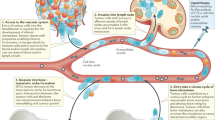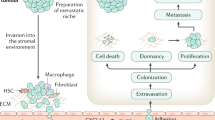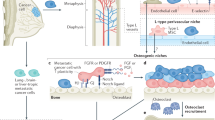Abstract
SKELETAL metastases are associated with progressive bone destruction but the pathogenesis is not well understood. I report here experiments which indicate that two principal mechanisms are involved. The first is mediated by osteoclasts and the tumour secretes a diffusable osteoclast activating factor; the second functions when the residual trabeculae are surrounded by the tumour cells.
This is a preview of subscription content, access via your institution
Access options
Subscribe to this journal
Receive 51 print issues and online access
$199.00 per year
only $3.90 per issue
Buy this article
- Purchase on Springer Link
- Instant access to full article PDF
Prices may be subject to local taxes which are calculated during checkout
Similar content being viewed by others
References
Galasko, C. S. B., Bone Jt Surg., 57 -B, 353–359 (1975).
Galasko, C. S. B., and Bennett, A., Nature, 263, 508–510 (1976).
Author information
Authors and Affiliations
Rights and permissions
About this article
Cite this article
GALASKO, C. Mechanisms of bone destruction in the development of skeletal metastases. Nature 263, 507–508 (1976). https://doi.org/10.1038/263507a0
Received:
Accepted:
Issue Date:
DOI: https://doi.org/10.1038/263507a0
This article is cited by
-
Harnessing the versatile role of OPG in bone oncology: counterbalancing RANKL and TRAIL signaling and beyond
Clinical & Experimental Metastasis (2020)
-
Establishment of successively transplantable rabbit VX2 cancer cells that express enhanced green fluorescent protein
Medical Molecular Morphology (2015)
-
Nuclear factor-kappa B ligand and osteoprotegerin levels in serum and gingival crevicular fluid in patients with bone metastases treated with zoledronic acid
Medical Oncology (2014)
-
Comparison of diagnostic ability between 99mTc-MDP bone scan and 18F-FDG PET/CT for bone metastasis in patients with small cell lung cancer
Annals of Nuclear Medicine (2012)
-
Molecular mechanisms of metastasis in prostate cancer
Asian Journal of Andrology (2009)
Comments
By submitting a comment you agree to abide by our Terms and Community Guidelines. If you find something abusive or that does not comply with our terms or guidelines please flag it as inappropriate.



